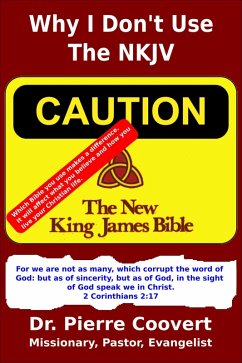Why I Don't Use The NKJV
In a world filled with multiple Bible translations, "Why I Don't Use The NKJV" explores the critical issue of selecting the most authentic version of God's word. It closely examines the well-respected King James Version (KJV) against its modern alternative, the New King James Version (NKJV).
The book starts by asserting that your choice of Bible version can significantly shape your understanding of Christianity. It acknowledges the NKJV's merits-like its basis in the Textus Receptus and retention of crucial verses such as 1 John 5:7. However, the author criticizes the NKJV for straying from this source, suggesting it could affect key doctrines, like the deity of Christ.
Challenging the idea that the NKJV is easier to read, the author argues that the KJV's unique linguistic features can enhance, not hinder, comprehension.
The book also delves into the issue of copyright requirements, suggesting that they introduce doctrinal inconsistencies. Citing 2 Corinthians 2:17, the author accuses modern versions of diluting God's message, potentially for questionable reasons.
Focusing on specific Greek terms and the manuscripts behind both versions, the text questions the reliability of the sources used for newer translations. The book scrutinizes word choices in the NKJV that could subtly alter core Christian teachings.
Through detailed verse comparisons, the author shows how the KJV's use of archaic pronouns like "thee," "thou," and "ye" lends a more accurate understanding of the text. It concludes that the multiplicity of Bible versions has led to doctrinal confusion and a weakening of the Christian faith.
For those concerned about scriptural fidelity in an age of religious diversity, "Why I Don't Use The NKJV" offers valuable insights into the significant consequences of choosing a Bible version.
In a world filled with multiple Bible translations, "Why I Don't Use The NKJV" explores the critical issue of selecting the most authentic version of God's word. It closely examines the well-respected King James Version (KJV) against its modern alternative, the New King James Version (NKJV).
The book starts by asserting that your choice of Bible version can significantly shape your understanding of Christianity. It acknowledges the NKJV's merits-like its basis in the Textus Receptus and retention of crucial verses such as 1 John 5:7. However, the author criticizes the NKJV for straying from this source, suggesting it could affect key doctrines, like the deity of Christ.
Challenging the idea that the NKJV is easier to read, the author argues that the KJV's unique linguistic features can enhance, not hinder, comprehension.
The book also delves into the issue of copyright requirements, suggesting that they introduce doctrinal inconsistencies. Citing 2 Corinthians 2:17, the author accuses modern versions of diluting God's message, potentially for questionable reasons.
Focusing on specific Greek terms and the manuscripts behind both versions, the text questions the reliability of the sources used for newer translations. The book scrutinizes word choices in the NKJV that could subtly alter core Christian teachings.
Through detailed verse comparisons, the author shows how the KJV's use of archaic pronouns like "thee," "thou," and "ye" lends a more accurate understanding of the text. It concludes that the multiplicity of Bible versions has led to doctrinal confusion and a weakening of the Christian faith.
For those concerned about scriptural fidelity in an age of religious diversity, "Why I Don't Use The NKJV" offers valuable insights into the significant consequences of choosing a Bible version.
Dieser Download kann aus rechtlichen Gründen nur mit Rechnungsadresse in A, B, CY, CZ, D, DK, EW, E, FIN, F, GR, H, IRL, I, LT, L, LR, M, NL, PL, P, R, S, SLO, SK ausgeliefert werden.









